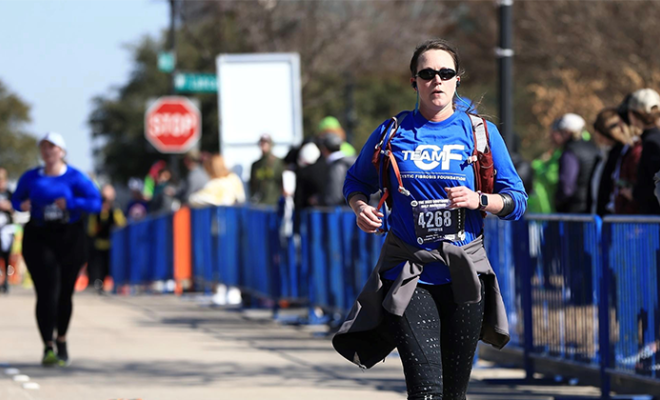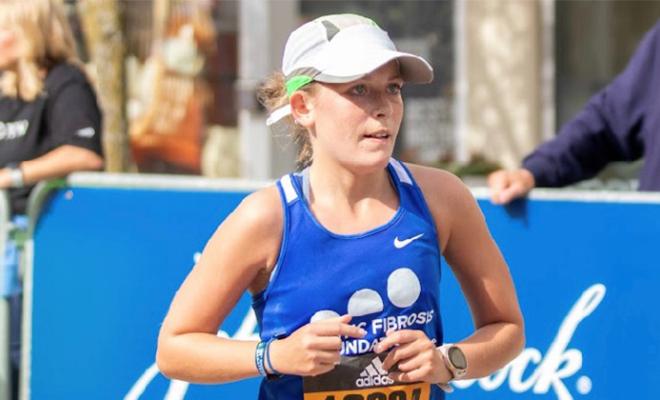Nutrition and cystic fibrosis can be very complex. On average, caloric needs of a person with cystic fibrosis are 1.5 to 2 times greater than a normal person — then you add on the needs of an endurance athlete, and for me that is running marathons. Combining the two equals to a ton of calories to consume in a day just to maintain weight. Then, if you stay aware of what you put in your body it is even harder to get in enough calories. Don’t get me wrong, I still consume more than my fair share of soda and gummy bears. But to be able to consume the number of calories needed and to meet nutrition needs, I add supplements to my diet.
When I started running, I had very little knowledge of what it would take to run a marathon in terms of nutrition. I ran my first half marathon simply because I was told that I couldn’t run the entire thing. After completing my first half marathon I remember how much I hurt the next day. Well, I thought this is the way it was supposed to be. I loved the feeling, not the hurt, but the process and the accomplishment of finishing what few people accomplish.
Fast forward several years and several half marathons later, I was becoming very aware of the aspect of nutrition and running. Something I thought was as simple as drink water and run quickly became very complex. How much protein do I need? How much salt do I need? What about caffeine? Sugar? Amino acids? When do I take enzymes and does that influence how my body absorbs everything?
By the time I decided to train for my first full marathon I had figured out that water was good, but definitely wasn’t the answer. Professional marathoners have their sweat tested and analyzed for what they need during the run. I had figured out a balance of fueling for my half marathons and I figured I would just double that and be good. Well, on about mile 16 of my first marathon I realized that wasn’t the best plan. To be honest I don’t remember what my nutrition strategy was — probably Gatorade and some type of gel. It took what felt like failing the marathon before I decided to reevaluate what I was doing. My first thought was I wasn’t getting enough nutrition, so I changed and had a plan to add more — more protein, caffeine, salt, and gels. After two more attempts at the marathon, I felt like I was still failing. It was time to reset.
I began to research the nutrition that elite athletes used and the companies behind them — not only looking at what they used, but how and when. I purchased several different products to try at the time I started training for my sixth marathon. I tried products that were said to give you energy, I had three servings of what should have been energy and took a nap after my run. After a couple different products, I looked at Bare Performance. It was easy on my stomach, and I felt good during my runs. So going into the Chicago Marathon in 2022 — my sixth marathon — felt very different.
The combination of changing my training and nutrition paid off in a big way. Not only did I hit a huge personal best, but I also qualified for the Boston Marathon! I will be running Boston in 2024, just days after I turn 40.
What I have learned through this entire process is there is no simple answer when it comes to nutrition with running marathons, not to mention the cystic fibrosis side. It is a little cliché, but during training it is not only about the miles, but also training your body — nutrition is a huge part of that. You should always be practicing the nutrition strategies in training. Not only when you’re taking what and when you’re taking things in on your run, but also the days before. I carb load before my long runs but avoid the night before because it doesn’t work for me. Sometimes less is more when it comes to nutrition, especially if you’re having stomach issues. What are the details of your nutrition? How much protein carbs, fat, calcium, caffeine, sugar, and the list goes on.
I will be clear this has not been a quick process, this journey has been several years long, my first marathon was in 2016. It has taken me six full marathons — plus more than 40 half marathons — to figure things out. I’m always willing to discuss in detail what I do. My biggest advice: be patient, listen to your body, and discuss anything with your clinic.
Interested in sharing your story? The CF Community Blog wants to hear from you.





